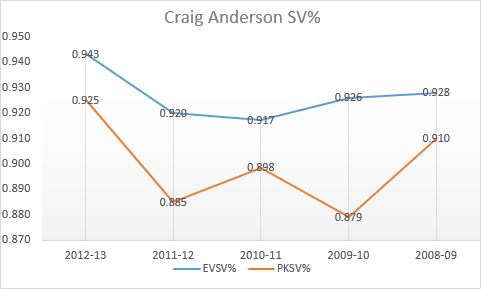Last year Craig Anderson was the team’s hero. When Spezza and Karlsson missed the majority of the season due to injury, Andy stepped up big, finishing the season with an astonishing .940 SV%. While it was evident that Anderson was bound to regress, it’s still a bit unnerving to see him posting a dreadful .897 SV% at the near halfway mark of the season. And with Robin Lehner rocking a .926 SV% it’s hard to blame the team’s defense for Anderson’s struggles.
So what happened to him? How does a guy go from so good to so horrible in such a short period of time? Well, the simplest explanation would be that if last season was a full 82 games long, we would have seen Anderson inevitably cool down by the end of the year. While that argument certainly makes sense, the drop-off in save percentage can also be attributed to how the stat it calculated, since it uses data from all situations, which would put a goalie like Craig Anderson at a disadvantage since the Sens lead the league in times shorthanded.
How each has faired at even-strength and on the penalty kill:
| Player | ESSV% | PKSV% |
| Anderson | 0.920 | 0.770 |
| Lehner | 0.926 | 0.919 |
Overall, Craig Anderson isn’t much worse than Robin Lehner at even-strength. Anderson’s 0.920 ESSV% is actually only slightly below the league average of ~0.923%, but his PKSV% is far below the league average of ~0.878%, whereas Lehner has been dominant in that category.
So how come one goalie is so much better than the other on the penalty kill? Is it possible Anderson is merely poor in penalty kill situations?
Here are the numbers for the past five seasons:
As you can see, his PKSV% has not always gone up and down along with his ESSV%. In 2010-11 when Anderson’s EKSV% dropped by 0.009 points (which may have been attributable to injuries), his PKSV% went up 0.019 points. Overall, there is much less variation in his ESSV% than PKSV%, indicating that there’s more luck involved in a goaltender’s performance on the penalty kill than at even-strength, which is why we should use ESSV% instead of overall SV% to evaluate a goaltender's performance.
Overall Craig Anderson’s ESSV% is right around in line with his recent past performance, so I don’t believe there is much reason to worry he's totally lost it.
Add The Sports Daily to your Google News Feed!
